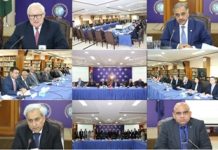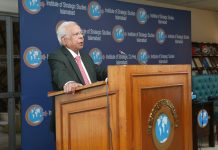Seminar on
Strategic Stability in South Asia: Is India a Responsible Nuclear State?
June 13, 2019
Welcome Remarks by Director General, ISSI
Our esteemed Keynote speaker, Gen Khalid Ahmad Kidwai, Excellencies, Distinguished Panellists, Ladies and Gentlemen, it gives me great pleasure to welcome you all to the Institute of Strategic Studies.
General Kidwai has had the privilege to serve this nation with great distinction. He remained at the helm of Strategic Plans Division in its formative, and most critical, years. It is a matter of great pride for the entire Pakistani nation that our nuclear capability has proved to be an effective deterrence against aggressions from our east. In making our deterrent robust, General Kidwai has played an important role. We are glad that he has accepted to give a key note address in this seminar.
We are also grateful for the presence of Ambassador Zamir Akram, who has served our country in numerous positions, including as our Ambassador to the Geneva based Conference on Disarmament and as Permanent Representative to the United Nations in Geneva. Thank you Zamir for agreeing to chair this session.
Our speakers in today’s seminar are mostly from the academic world. On behalf the Institute, I welcome Dr Rizwana Abbasi, Dr Zafar Khan, Dr Zafar Nawaz Jaspal, and Dr Mansoor Ahmad.
Ladies and Gentlemen,
As you are well aware, the world around us is changing rapidly. US now regards China, and Russia, as its competitors, even rivals. US’s Indo Pacific Strategy, which has just been elaborated by Pentagon, is being perceived largely as a China containment policy. Multilateralism is being marginalized. Unilateralism is on the rise. Anti-globalism, trade wars, xenophobia, and narrow nationalism are challenging the foundations of the world that was erected after the second world war. Walls are going up. Bridges coming down.
In the backdrop of this grim geo-political scene, one serious challenge is the fast deterioration ofinternational security environment. The arms control understandings between the US and Russia are collapsing. In just two months, August 2019, INF (Intermediate range Nuclear Forces) would be formally terminated, removing any restrictions on the development of intermediate and short range ballistic missiles with the range of 500 to 5500 km. The New Start agreement, if not renewed in 2021, would remove limits on the US and Russian nuclear stockpiles and their delivery systems.US NPR (Nuclear Posture Review) 2018 has decided to modernize its nuclear infrastructure and capabilities. New arms races are emerging.
Consequently, the overall concept of strategic stability has come under deep stress. Last month, I was in China where we interacted with CACDA (China Arms Control and Disarmament Association), and two other think tanks, CIISS and CICIR. I noticed a sense of concern in the experts on the growing disregard by the US for the concept of Strategic Stability. This is alarming. Strategic stability at international and regional levels prevents wars, reduces the risk of nuclear confrontations, and makes our world safer.
Unfortunately, some ambitious states in our world are seriously undermining strategic stability. Take for example South Asia. Since 1998, when both India and Pakistan became overtly nuclear, the risk of an all-out war has been averted; however,time and again India has tested the limits of nuclear deterrence. India’s ambitious and aggressive nuclear posture is undermining the concept of strategic stability in South Asia. And there are clear pointers to that end:
- India is feverishly arming itself, and was declared by Sipri as the 4th largest defense spender in 2018.
- It is adopting aggressive warfighting doctrines like cold start, preemptive counterforce 1st strike, and appears to be shifting from its already vague NFU position.
- Of late, India has embarked upon a dangerous practice of threatening neighboring Pakistan with surgical strikes, like the one it carried out on 26thFebruary this year.
- Indo US nuclear deal has further emboldened India, which now has access to international nuclear market through 2008 NSG waiver, and nuclear agreements with UK France Japan and US.
- India and US have signed agreements like LEMOA and COMCASA which further enhance the logistical and communication capabilities of the Indian forces.
- India is also embarking on nuclearization of Indian Ocean by acquiring nuclear powered submarines like INS Chakrafrom Russia and home built Arihant, with plans to induct six nuclear powered attack submarines (SSN) in the next 15 years which gives it a second-strike capability.
- India is acquiring BMD technologies like missiles to take out incoming missiles at 80 kilometer range, and recently an anti satellite test that it carried out. India is also acquiring S400 missiles from Russia, with first battery expected by October 2020.
- There are reports that India has kept its nuclear systems inventory in both CF and CV settings.
The above facts clearly indicate that India is pushing ahead with its ambitions, with little or no regard for strategic stability in South Asia. Pakistan, on the other hand, is strictly adhering to credible minimum deterrence and would not like to indulge in any arms race. Pakistan believes that the two contiguous nuclear powers should behave in a responsible manner. For its part, nuclear Pakistan has focused on achieving highest standards of nuclear safety, nuclear security, export controls, and robust command and control. If Pakistan is behaving in a responsible manner pursuing credible minimum deterrence, then why is it that India feels the need to pursue such an ambitious nuclear and conventional program? Is it thedesire to become a regional hegemon or a status seeking global power, or simply an irresponsible bravado?Or perhaps all three.
Part of the answer became evident in the post Pulwamaactions taken by India. While remaining below the nuclear threshold, India is increasingly instigating conventional confrontation with Pakistan. On 26th February Indian aircraft intruded in Pakistani airspace and dropped a payload in an empty plot in Pakistan. On 27th February, two Indian planes violated Pakistan airspace, which were downed by Pakistan air force and a pilot captured. What if Pakistan had responded in kind?Did India think of the consequences? In sharp contrast to this false bravado, Pakistan acted maturely, and released the Indian pilot as a peace gesture and to de-escalate the dangerous situation. Further, Indian leadership, particularly Prime Minister Modi flaunted India’s nuclear capability against Pakistan.
The larger question is should a nuclear state conduct itself in such an irresponsible manner? In the Nuclear Suppliers Group, India wants the international community to believe that it was a like-minded responsible state. Is what India did post Pulwama the conduct of a responsible nuclear state or an irresponsible nuclear state?
This broader question, Ladies and Gentlemen, is the purpose of this seminar. Today, we want to understand better what is it that motivates Modi’s India to behave like an irresponsible nuclear state, with little regard for impact on strategic stability in South Asia. The sad reality, Ladies and Gentlemen, is that Strategic stability in South Asia has been held hostage to Indian ambitions of grandeur. This, combined with an unwillingness for any meaningful dialogue with Pakistan to resolve issues between the two countries, especially festering Kashmir dispute, makes South Asia a vulnerable andconflict-prone region for the foreseeable future. With the re-election of Narendra Modi, who pursues an extremistHindutva ideology, India is likely to continue its irresponsible aggressive posture towards Pakistan. World community should be worried. South Asia is worried. And in fact, India itself should be worried.
Without further ado, I leave this question for the esteemed Keynote speaker, General Kidwai and the learned panellists to debate on.
Thank You.














